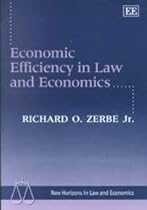Economic Efficiency in Law and Economics (New Horizons in Law and Economics Series)

| Author | : | |
| Rating | : | 4.20 (943 Votes) |
| Asin | : | 184064611X |
| Format Type | : | paperback |
| Number of Pages | : | 336 Pages |
| Publish Date | : | 0000-00-00 |
| Language | : | English |
DESCRIPTION:
'Zerbe's new book is high-powered and potentially important.' -- - Bill Goodman, Monthly Labor Review, June 2002
Evans School of Public Affairs, Adjunct Professor, Law School, University of Washington and Editor of Research in Law and Economics . Richard O. Zerbe Jr., Professor of Public Affairs, Daniel J
William Goodman said Zerbe advances benefit-cost analysis but leaves flaws. Zerbe's new book concerns the proper role of benefit-cost analysis in societal decisions such as legal judgements (including precedents), government regulations, and even common law. He improves on earlier concepts of benefit-cost analysis in two major ways: by including transactions costs (like the incidental costs of a sale made inevitable by a change in law or regulation) in calculating the cost to society
He develops a theory of common law efficiency and indicates the circumstances under which a common law will be inefficient.. In this text Zerbe introduces a way to think about the concept of economic efficiency that is both consistent with its historical derivation and more useful than contemporary concepts. He then applies the analysis to a number of hard and interesting cases, including the economics of duelling, cannibalism and rape. He establishes an expanded version of Kaldor-Hicks efficiency as an axiomatic system that performs the tasks of: allowing an expanded range for efficiency analysis; and estabilshing the conditions under which economists can reasonably say that some state of the world is inefficient
